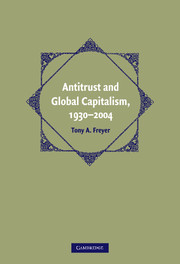Book contents
- Frontmatter
- Contents
- Acknowledgements
- Antitrust and Global Capitalism, 1930–2004
- Introduction
- 1 Reconstituting American Antitrust, 1937–1945
- 2 Protectionism over Competition: Europe, Australia, and Japan, 1930–1945
- 3 American Antitrust since 1945
- 4 Japanese Antitrust since 1945
- 5 Antitrust in Postwar European Social Welfare Capitalism
- 6 Antitrust Resurgence and Social Welfare Capitalism in Postwar Australia
- Conclusion
- Index
3 - American Antitrust since 1945
Published online by Cambridge University Press: 03 May 2010
- Frontmatter
- Contents
- Acknowledgements
- Antitrust and Global Capitalism, 1930–2004
- Introduction
- 1 Reconstituting American Antitrust, 1937–1945
- 2 Protectionism over Competition: Europe, Australia, and Japan, 1930–1945
- 3 American Antitrust since 1945
- 4 Japanese Antitrust since 1945
- 5 Antitrust in Postwar European Social Welfare Capitalism
- 6 Antitrust Resurgence and Social Welfare Capitalism in Postwar Australia
- Conclusion
- Index
Summary
After World War II containing American managerial capitalism's national and international hegemony was a continuing struggle. Policy makers and corporate managers grappled with how to maintain a dynamic consumer society and economic growth amidst mounting competition from the market-based economies of developed nations – including former enemies, Japan and Germany – as well as persistent civil rights conflicts at home, the communist threat from abroad, the emergence of developing nations as colonialism collapsed, and after the end of the cold war, challenges identified with globalization. This chapter examines how postwar American antitrust and trade policies shaped corporate investment and restructuring strategies through the discourse of public authorities and legal/economic experts. Managerial capitalism's hegemony was more contested and the accountability imposed on multinational corporations more effective than critical images of regulatory capture or arbitrage suggested. Section I considers the interaction between the institutions and elite cultural opinion legitimating the liberal state and corporate diversification strategies at home and abroad from the mid-1940s to the end of the 1960s. Section II focuses on the liberal antitrust policies and institutional culture during the initial postwar phase. Section III explores the triumph of government deregulation and market fundamentalism reflected in public and professional discourse during the pronounced swings of the business cycle from the1970s to the turn of the century. Section IV examines changes in and the sporadic tension between antitrust and trade policies during this period.
- Type
- Chapter
- Information
- Antitrust and Global Capitalism, 1930–2004 , pp. 102 - 159Publisher: Cambridge University PressPrint publication year: 2006



